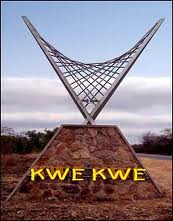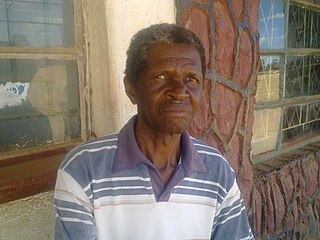Related Research Articles

Gweru, originally known as Gwelo, is a city in central Zimbabwe. Near the geographical centre of the country. It is on the centre of Midlands Province. Originally an area known to the Ndebele as "The Steep Place" because of the Gweru River's high banks, in 1894 it became the site of a military outpost established by Leander Starr Jameson. In 1914 it attained municipal status, and in 1971 it became a city.

Zvishavane, originally known as Shabani, is a mining town in Midlands Province, Zimbabwe. Surrounded by low hills, it lies 97 kilometres (60 mi) west of Masvingo, on the main Bulawayo-Masvingo road. Other roads lead from Zvishavane to Gweru, 121 kilometres (75 mi) north, and Mberengwa, 27 kilometres (17 mi) south-west. It is also on direct rail links to Gweru and Beit Bridge which then link up with Harare and Bulawayo in Zimbabwe and to Maputo in Mozambique, and Pretoria in South Africa. It has a private airport serving the city.
The National Railways of Zimbabwe (NRZ), formerly Rhodesia Railways, is a state-owned company in Zimbabwe that operates the country's national railway system.

The Zimbabwe National Army (ZNA) is the primary branch of the Zimbabwe Defence Forces responsible for land-oriented military operations. It is the largest service branch under the Zimbabwean Joint Operations Command (JOC). The modern army has its roots in the Rhodesian Army, which was raised between 1963 and 1964 after the breakup of the Federation of Rhodesia and Nyasaland. A Joint High Command created in March 1980 to oversee integration of the formerly belligerent Rhodesian Security Forces, Zimbabwe African National Liberation Army (ZANLA), and the Zimbabwe People's Revolutionary Army (ZIPRA) officially established the Zimbabwe National Army in late 1980, nearly a year after the end of the Rhodesian Bush War.

Kwekwe, originally known as Que Que, is a city in the Midlands province of central Zimbabwe. The city has a population of 119,863 within the city limits, as of the 2022 census, making it the 7th-largest city in Zimbabwe and the second-most populous city in the Midlands, behind Gweru.

Midlands State University is a government owned university in Zimbabwe. The university has 9 faculties offering a wide variety of courses and many specialist programmes. The university is accredited through the National Council for Higher Education, under the Ministry of Higher and Tertiary Education of Zimbabwe.

Kwekwe, originally known as Que Que, is a district in Zimbabwe.

The Greeks in Zimbabwe comprise about 3,000 people of Greek origin, almost half of them from the island of Cyprus. Zimbabwe currently hosts eleven Greek Orthodox churches and fifteen Greek associations and humanitarian organizations.

The history of the Jews in Zimbabwe reaches back over one century. Present-day Zimbabwe was formerly known as Southern Rhodesia and later as Rhodesia.

Sebakwe River or Zibagwe River is a river in Zimbabwe.
Tichafa Samuel Parirenyatwa was Zimbabwe's first trained black physician, medical doctor and the first vice-president of the Zimbabwe African People's Union (ZAPU). He rose to prominence during ZAPU's political struggle against the colonial administration in Southern Rhodesia.
The Kwekwe-Gokwe Highway or the R84-7 Highway is an all-weather bitumen macadam highway in Zimbabwe running from Kwekwe to Gokwe passing through Zhombe. As a trunk road it is officially designated as the P11 Highway.


Morgan Mahanya is a Zimbabwean Shona-language writer of detective fiction and war fiction. He has published 13 books since 1976, including books in Shona and in English, both fiction and nonfiction. Mahanya is one of the pioneering writers of detective stories in the Shona language. His books Chidamwoyo, Zvinoyera and The Wound are about the Rhodesian Bush War.
Dr. Cephas George Msipa was a Zimbabwean teacher, philanthropist and politician who served as the Governor of Midlands Province.
Peter William Hewlett is a Zimbabwean farmer and politician who served as a member of Parliament in the House of Assembly from 1990 to 2000. A member of ZANU–PF, he represented the Zhombe and Kwekwe North constituencies.
Highlands is an upper class, residential suburb in the east of Harare, best known as the home of the Zimbabwe Broadcasting Corporation, and for its ethnic diversity, history, natural environment and splendid panoramic views of downtown Harare. It is often grouped in the inner east suburbs of Harare such as Eastlea, Highlands, Greendale and Milton Park.
References
- ↑ Louise Newitt, (1978) Prominent Rhodesian Personalities pg 173
- ↑ Front page, The Midlands Observer Vol. VI, No.30
- ↑ Front page, The African Daily News, Saturday October 5, 1957
- ↑ Pamphlet for the Capricorn Africa Society 1957
- ↑ The front page, Lusaka Central African Post, late afternoon edition, Monday, October 18, 1954
- ↑ Cephas G. Msipa (Memoir), In pursuit of Freedom and Justice pg. 29
- ↑ "Gweru Naran Centre". jairosjiriassoc.com. Retrieved 12 December 2017.
- ↑ Electoral pamphlet ‘A personal message to the rate payers of KweKwe (Queque) – Kwekwe (Queque) Municipal elections, 1972 by Prag L. Naran.
- ↑ Front page, Indian Views, No.24, Wednesday, December 18, 1957